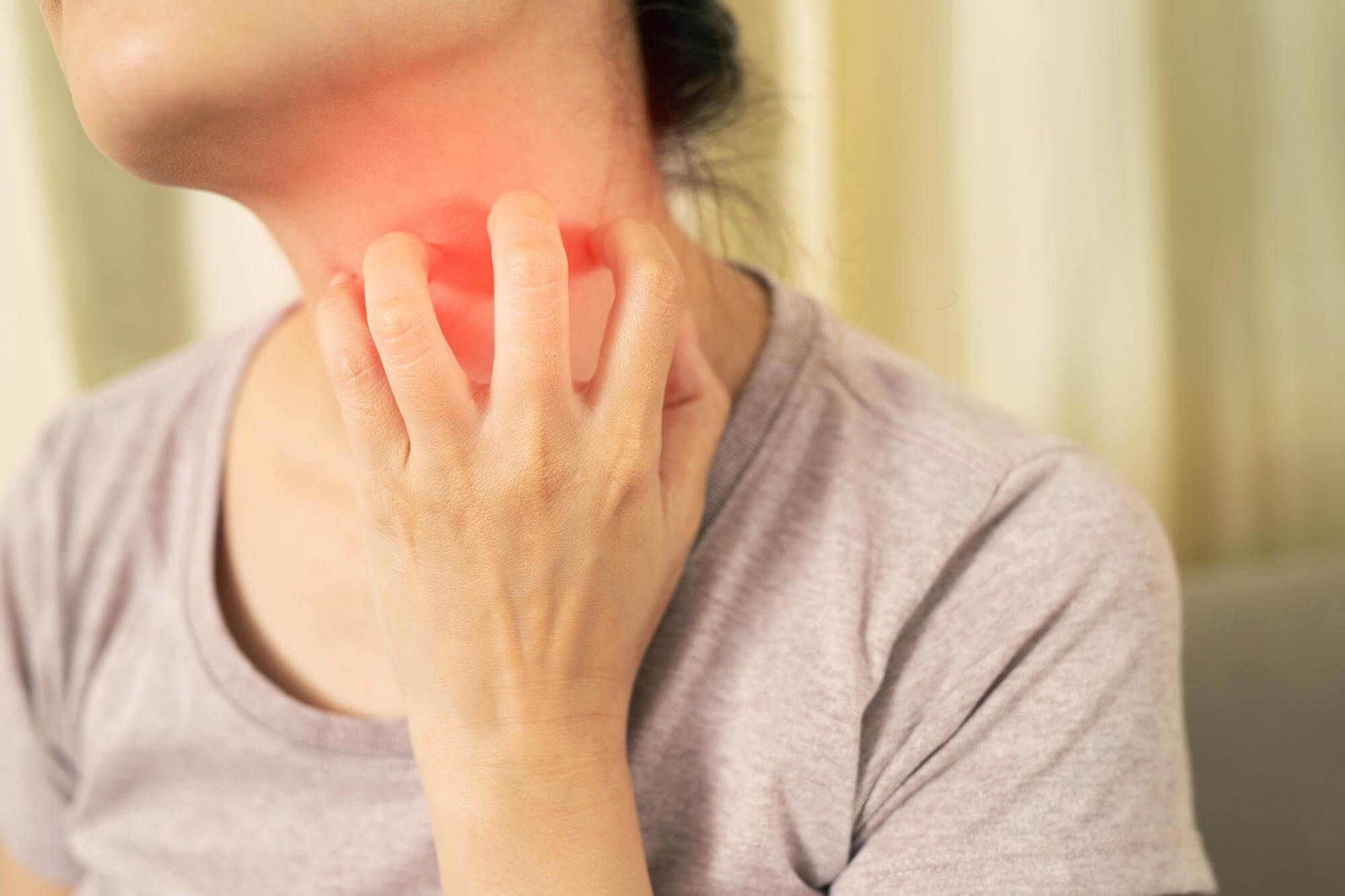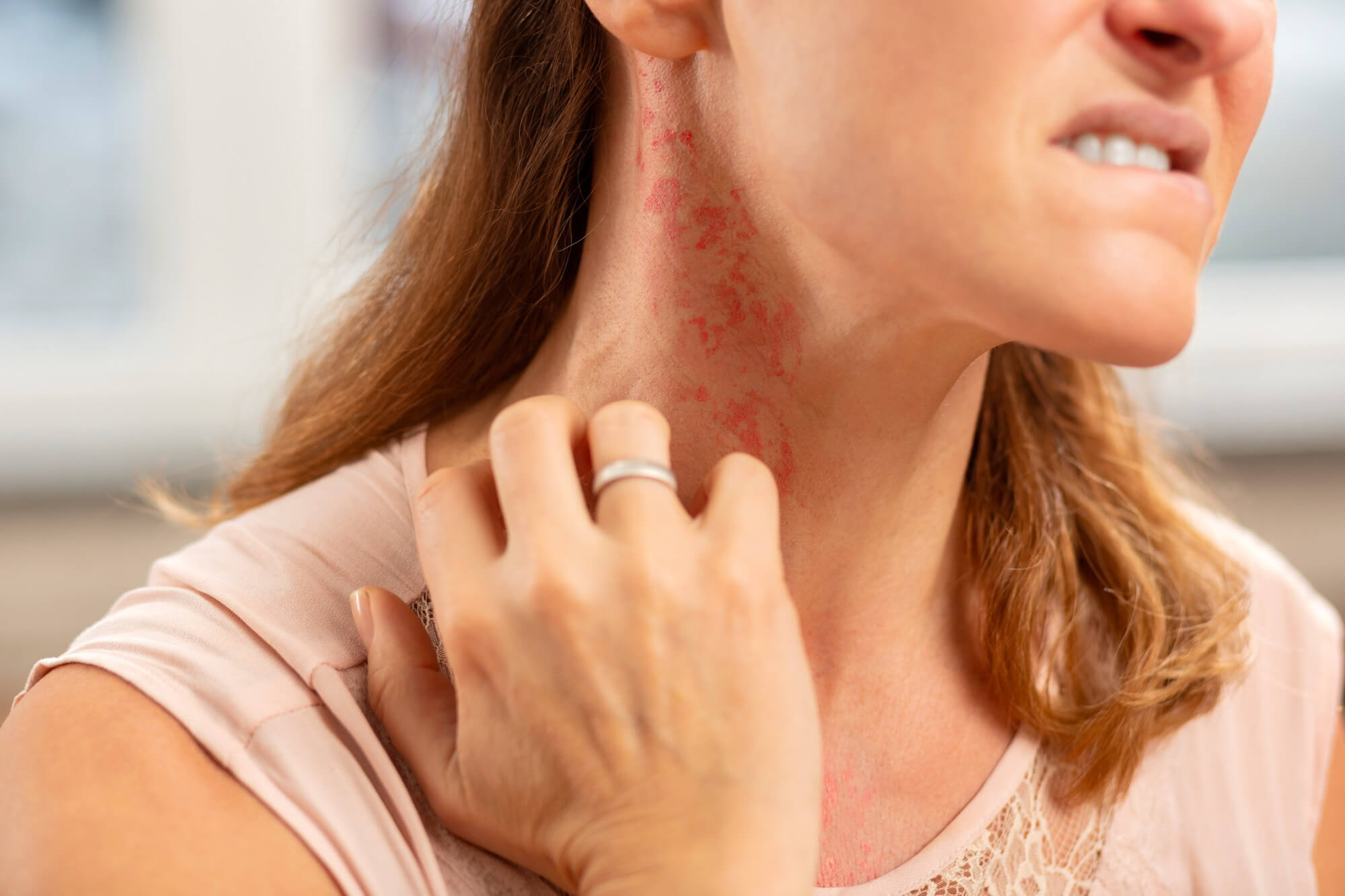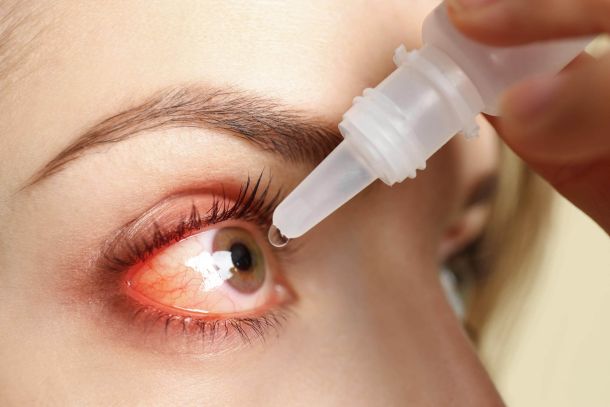Neck allergies: why do they occur and what to do?


Eva Zakharova
Neck allergies are a common problem causing a lot of discomfort. In this article we will discuss the main causes of an allergic rash on the neck, allergies around the neck, as well as methods of diagnosis and treatment.
Causes of allergies around the neck
Neck allergies can occur for a variety of reasons, including contact dermatitis, food allergies, atopic dermatitis, drug allergies, and insect bites.
Contact dermatitis results from direct contact with an allergen. Possible sources of contact dermatitis include:
- Some people are allergic to metals, such as nickel found in jewelry and accessories.
- Allergies to cosmetics and skin care products can cause an allergic rash on the neck. These products may contain allergenic ingredients such as preservatives, fragrances, and dyes.
- Textiles, such as synthetic fabrics, or certain components of laundry detergents can cause an allergic reaction on the neck.
In food allergies, food allergic spots on the neck can result from the consumption of certain foods, such as eggs, milk, nuts, or fish.
Atopic dermatitis is a chronic skin condition that presents with dry, itchy, and inflamed skin. The neck may be one of the areas affected by atopic dermatitis.
Drug allergies manifest as rashes on the skin, including the neck, due to taking certain medications such as antibiotics, aspirin and other drugs.
An allergic reaction to insect bites, such as mosquitoes, bees or wasps, can lead to redness, itching and swelling in the neck area.
Neck allergy symptoms

Symptoms of allergies in the neck may include:
- Itching, the most common symptom of allergies in the neck, often accompanied by redness of the skin.
- Dry and flaky skin can be a manifestation of allergic dermatitis or atopic dermatitis.
- Inflammation and swelling can result from contact with an allergen or in response to insect bites.
- Watery pimples and rashes can be signs of contact dermatitis, food allergies, or drug allergies.
- Cracks and crusts can form as a result of prolonged scratching of the skin or when allergic rashes are not properly cared for.
Diagnosis of neck allergy
To diagnose an allergy on the neck, the doctor may perform the following tests:
- The doctor examines the affected skin area for characteristic signs of allergies.
- Collecting a medical history helps the doctor determine possible causes of the allergy, considering contact with allergens, food intake, and medication use.
- Allergy tests may be performed to identify the specific allergen causing the reaction:
- Using skin tests, the doctor can determine which substances are causing the allergic reaction.
- An immunoglobulin E blood test can be used to determine the presence of antibodies to specific allergens.
- Differential diagnosis may be done to rule out other conditions that have similar symptoms to neck allergy.
Treatment of neck allergy

Treatment of neck allergies includes the following methods:
The first and most important step in treating neck allergies is eliminating contact with the allergen.
Allergy medications
Depending on the cause of the allergy, your doctor may prescribe anti-allergy medications:
Antihistamines, such as cetirizine, loratadine or fexofenadine, help reduce itching, redness and swelling.
Corticosteroids, such as hydrocortisone or mometasone, may be prescribed to reduce inflammation and itching.
Calcineurin inhibitors, such as tacticolimus and pimecrolimus, may be used to reduce inflammation and itching in atopic dermatitis.
Topical treatment
Topical treatment may include the use of creams and ointments, as well as masks and compresses to reduce the symptoms of allergies on the neck:
Creams and ointments such as Bepanten, Fenistil, La Crie or Emolium can moisturize and soothe the skin, reducing itching and dryness.
Masks and compresses with soothing and anti-inflammatory ingredients such as chamomile, calendula, aloe vera or succession can have a positive effect on the skin.
Physiotherapy and folk remedies

Physical therapy, such as UV therapy or laser therapy, can be used in combination with folk remedies, including herbal decoctions and infusions, to treat neck allergies.
Preventing allergies in the neck
Prevention of neck allergies includes avoiding contact with known allergens, proper skin care, using hypoallergenic grooming products and clothing, and following your doctor's recommendations for diet and medication.
In conclusion, neck allergies can have various causes, including contact dermatitis, food allergies, atopic dermatitis and drug allergies. Symptoms can range from itching and redness to dryness, flaking and inflammation. To diagnose neck allergy, a visual examination, history, allergy tests and differential diagnosis are performed. Treatment includes elimination of contact with the allergen, use of anti-allergy medications, local treatment, physical therapy and folk remedies. Prevention of neck allergies involves avoiding contact with allergens, proper skin care, and following your doctor's recommendations.
New materials
Popular Articles
We recommend reading
Contact us in the Contact Us section to ask questions, offer ideas, or for more information about our allergy resource.
Our articles are your trusted source of allergy knowledge. Learn how to make life with allergic reactions easier on our specialized portal.
©
Lechenie-Allergii.com. All rights reserved.
© Lechenie-Allergii.com. All rights reserved.
The information on this site is for informational purposes only and is not a substitute for professional medical advice. We recommend consulting with qualified medical professionals for accurate information and advice.
 English
English  Українська
Українська  Русский
Русский 









